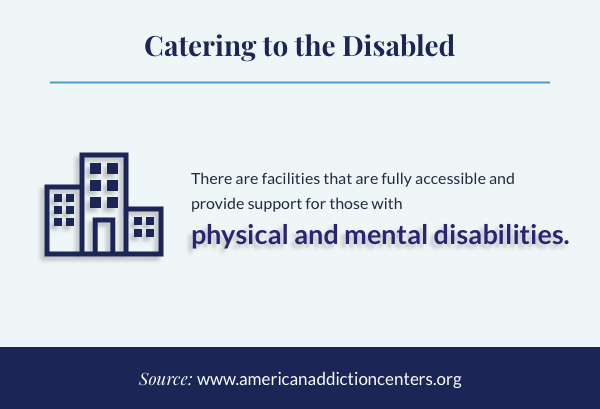Drug Rehab Centers for the Physically and Mentally Disabled
According to the most recent National Survey on Drug Use and Health, about 21.5 million people in the US have some form of substance use disorder.
Many of those people also have some form of mental or physical disability, which can make it a challenge for this segment of the population to get needed rehab services for substance abuse or addiction.
Treatment options do exist for people with mental and physical disabilities; however, not all treatment centers are able to provide the treatment options, responses to concerns, or specific programs needed for people who have physical and mental health disabilities and who are also in need of treatment for addiction. To help people with disabilities recover from substance abuse or addiction, a treatment center and its staff need to understand what the special needs of these populations are.
Disabilities and Addiction
While the connection between disability and substance abuse is still being researched, there are definite connections between the two. Information from the Christopher and Diana Reeve Foundation Paralysis Resource Center indicates that substance abuse occurs more often in the disabled community than in the general population.
- More than 50 percent of people with traumatic brain injury, spinal cord injury, and mental illness abuse drugs or alcohol.
- People with disabilities like deafness, arthritis, and multiple sclerosis have substance abuse rates that are double those of the general population.
- About half of people with spinal cord injury, amputation, blindness, or degenerative diseases who drink alcohol can be classified as heavy drinkers.
- Approximately 4.7 million people with disabilities have a co-occurring substance use disorder.
This population is particularly in need of drug abuse and addiction treatment services that can meet their needs.
Available Treatment Options
The Substance Abuse and Mental Health Services Administration (SAMHSA) demonstrates that while both people with and without disabilities often experience barriers to treatment, such as not being able to afford it, those with disabilities have additional barriers that can make it difficult to get treatment even if they have the money and the desire to get help. Finding facilities that are fully accessible for those with physical disabilities, or that provide the additional support needed for those with physical or mental disabilities, can be difficult.
However, facilities that accommodate these specific needs do exist. Based on the individual’s specific disability and the concerns related to that challenge, programs can provide the range of services needed, including accessibility to both physical space and information.

Physical Disability: Concerns When Seeking Treatment
For people with physical disabilities, like spinal cord injury, amputation, or arthritis, as well as for those with sensory disabilities like blindness and deafness, the main concerns surrounding treatment involve accessibility. The simple inability to be able to access all areas of the treatment center with a wheelchair can mean the difference between a person being able to get appropriate treatment or being left out of that possibility.
In addition, communication can be a problem. For a deaf person, having someone who can sign during counseling sessions is important, as is making reading materials accessible for those who are blind through braille materials or other means.
However, many treatment facilities do not provide this level of accessibility. The American Association on Health and Disability demonstrated that a large percentage of facilities – more than half – had to turn away patients with traumatic brain injury or spinal cord injury because of physical barriers to treatment. In other words, the facilities were not accessible. This was true whether or not the facilities were public or privately owned, or were residential, outpatient, or hospital-based.
Mental Disability: Concerns When Seeking Treatment
Those with mental disabilities require concessions to accessibility of a different kind. For this segment of the population, the issue often involves not being able to take in or process the information provided as easily, resulting in the person becoming discouraged and giving up on treatment. Therefore, the concerns for treatment of those with cognitive or intellectual disabilities tend more toward finding programs that can help these individuals get the most out of the program within their cognitive limitations.

Backing this up, research in the Journal of Studies on Alcohol and Drugs seems to indicate that, while people with physical disabilities could participate in mainstream treatment programs as long as physical accessibility was provided, those with mental disabilities would be better served with specialized programs and staff who are trained specifically to meet their cognitive needs.
Specific Programs Needed for People with Physical Disabilities
Based on the information above, the following are some specific programs needed for those with physical disabilities:
- Integrated substance abuse treatment and vocational rehabilitation: This is generally recommended for people undergoing substance abuse treatment anyway, as described by SAMHSA. However, it can be particularly important for those who are also struggling with the challenges of a physical disability. Integrating vocational rehab into addiction treatment can provide motivation and meaning to the treatment process, which increases the chances of a positive outcome.
- Accessibility: As discussed above, providing accessibility options for those who need them goes a long way toward getting this vulnerable population into treatment. Elevators, ramps, and other mobility aids are just part of this. Providing braille or audio materials for those with visual impairments, and enabling access to staff members or contracted personnel who are proficient in sign language for those who are deaf are also important elements of care.
- Physical therapy and exercise: Many facilities incorporate exercise programs as part of treatment; exercise provides motivation and can help a person to manage cravings and triggering emotions. For those with physical disabilities, however, exercise may be limited or may not be an option. Providing physical therapy in its place, or having more accessible options for exercise, can help meet the needs of these individuals while still meeting the goal of this vital program element.
- Specialized understanding of specific disabilities and substance abuse outcomes: Understanding the substance abuse issues of those with specific disabilities can help provide programs that meet individualized needs. For example, people with spinal cord injuries are more likely to abuse prescription painkillers, as described in International Journal of the Addictions. This can lead to higher levels of depression and non-acceptance of the disability, resulting in poorer recovery outcomes.
Specific Programs for Those with Mental Disabilities
An article in Social Work Today helps to clarify what is needed for those with mental disabilities:
- Simplification of presentations and resource materials: Whether the disability involves intellect, attention, or retention of information, simplified materials and presentations can help.
- Comprehension checks and repetition: This can help the individual keep track of information and retain knowledge better.
- Variety: Providing various types of information – visual, auditory, or tactile – can help the individual maintain interest for a longer period of time.
- Teaching rather than sharing: People with mental disabilities may struggle with taking one person’s experience and applying it to their own lives on their own. Teaching a general model and then helping the individual apply it can go further in helping the individual understand why it’s beneficial to avoid using drugs and alcohol.
- Specialized staff: Having staff who are trained in managing and supporting people with mental health disabilities is important in providing the specialized care needed by this population.
Finding the Right Treatment Center
For those who struggle with mental or physical disabilities, it’s important to find a treatment center that understands and that can provide this level of care. Talking with an intake specialist to determine whether or not the facility can meet these needs is an important step before selecting a facility. If needed, groups like the American Association on Health and Disability can provide resources that help an individual or loved ones find an appropriate facility.
Once the right treatment center for the individual has been found, specialized services can help that person take in the information needed to learn new skills and coping mechanisms to create a future managing the disability and the substance use disorder. This can give the person a positive chance at maintaining abstinence and a life of recovery far into the future.
Take Our Substance Abuse Self-Assessment
Take our free, 5-minute substance abuse self-assessment below if you think you or someone you love might be struggling with substance abuse. The evaluation consists of 11 yes or no questions that are intended to be used as an informational tool to assess the severity and probability of a substance use disorder. The test is free, confidential, and no personal information is needed to receive the result.
